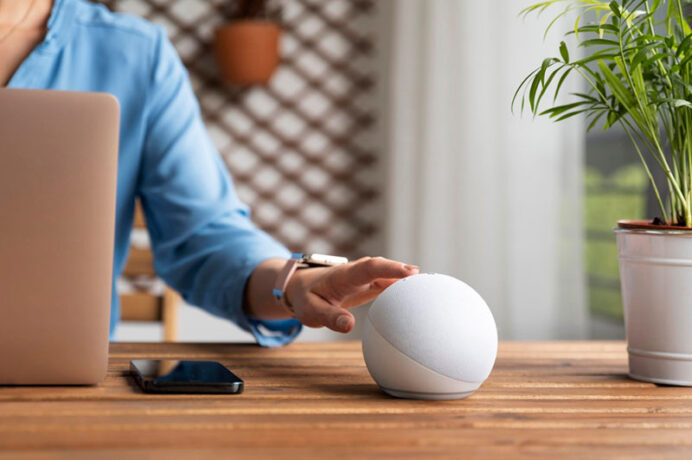In recent years, smart home automation has become increasingly popular as people seek to simplify their lives and make their homes more efficient. One of the key components of this automation is the use of smart voice assistants and hubs.
Smart voice assistants, such as Amazon’s Alexa, Google Assistant, and Apple’s Siri, are becoming an integral part of many people’s lives. They can be used to control a range of smart devices in the home, from lighting and thermostats to smart locks and security cameras. With a simple voice command, users can adjust the temperature, turn off lights, or even check the weather forecast.
Amazon’s Alexa
Amazon’s Alexa is a voice assistant developed by Amazon that is used in their Echo line of smart speakers and other compatible devices. Alexa can respond to voice commands and provide information on a wide range of topics, including news, weather, and traffic updates. Alexa can also be used to control smart home devices such as lighting, thermostats, and security systems, as well as play music and make calls.
One of the key features of Alexa is its ability to be integrated with a wide range of third-party services and devices, allowing users to control and manage a variety of smart home products using voice commands. Alexa also has a growing list of skills, which are essentially apps that allow users to do things like order pizza, play games, and even meditate.
Alexa is widely considered to be one of the most advanced and reliable voice assistants on the market, thanks in large part to Amazon’s ongoing investment in its development. With a user-friendly interface and a growing ecosystem of compatible products and services, Alexa is a popular choice for those looking to add voice control to their smart home.
Google Assistant
Google Assistant is a voice assistant developed by Google that is available on a wide range of devices, including smartphones, smart speakers, and smart displays. Google Assistant can respond to voice commands and provide information on a wide range of topics, including news, weather, and traffic updates. Like Alexa, Google Assistant can also be used to control smart home devices such as lighting, thermostats, and security systems, as well as play music and make calls.
One of the key strengths of Google Assistant is its integration with other Google services, including Google Maps and Google Calendar, allowing users to access and manage their information seamlessly. Google Assistant also has a growing list of actions, which are essentially apps that allow users to do things like order food, play games, and even find a lost phone.
Google Assistant is widely considered to be one of the most intelligent and versatile voice assistants on the market, thanks in large part to Google’s investment in artificial intelligence and machine learning. With its natural language processing capabilities and ability to understand complex queries, Google Assistant is a popular choice for those looking for a powerful and flexible voice assistant.
Apple’s Siri
Apple’s Siri is a voice assistant developed by Apple that is available on Apple devices, including the iPhone, iPad, Mac, Apple Watch, and HomePod smart speaker. Siri can respond to voice commands and provide information on a wide range of topics, including news, weather, and sports scores. Siri can also be used to control smart home devices such as lighting, thermostats, and security systems, as well as play music and make calls.
One of the key features of Siri is its integration with other Apple services, including Apple Music and Apple Maps, allowing users to access and manage their information seamlessly. Siri also has a growing list of skills, which are essentially apps that allow users to do things like order food, book a ride, and even make payments.
Siri is widely considered to be one of the most user-friendly and accessible voice assistants on the market, thanks in large part to its integration with Apple’s ecosystem of products and services. With its natural language processing capabilities and ability to understand context, Siri is a popular choice for those looking for a voice assistant that works seamlessly with their Apple devices.
Smart hubs, on the other hand, serve as a central control system for smart devices in the home. They allow users to control multiple devices from a single app or device, simplifying the process of managing a smart home. Smart hubs can also integrate with voice assistants, allowing users to control their smart devices with voice commands.
The benefits of smart voice assistants and hubs are numerous. They can make daily tasks more efficient and convenient, while also providing a range of entertainment and informational services. For example, users can ask their voice assistant to play music, set reminders, or even order a pizza.
Additionally, smart voice assistants and hubs can improve home security by allowing users to control and monitor their security systems remotely. They can also be integrated with smart cameras and doorbells, allowing users to see and communicate with visitors even when they are not home.
Another key benefit of smart voice assistants and hubs is their ability to save energy and reduce utility bills. Users can set up schedules and routines for their smart devices, ensuring that they are only in use when needed. This can include turning off lights when a room is unoccupied, or adjusting the thermostat when no one is home.
In summary, smart voice assistants and hubs are an essential part of a modern smart home. They provide a range of benefits, from convenience and entertainment to improved security and energy efficiency. With the continued growth of smart home automation, it is likely that these devices will become even more advanced and integrated in the years to come.

